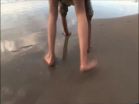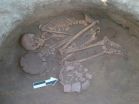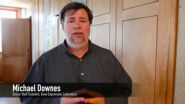(Press-News.org) LOS ANGELES (STRICTLY EMBARGOED UNTIL 2 P.M. EDT ON JULY 16, 2014) – Cardiologists at the Cedars-Sinai Heart Institute have developed a minimally invasive gene transplant procedure that changes unspecialized heart cells into "biological pacemaker" cells that keep the heart steadily beating.
The laboratory animal research, published online and in today's print edition of the peer-reviewed journal Science Translational Medicine, is the result of a dozen years of research with the goal of developing biological treatments for patients with heart rhythm disorders who currently are treated with surgically implanted pacemakers. In the United States, an estimated 300,000 patients receive pacemakers every year.
"We have been able, for the first time, to create a biological pacemaker using minimally invasive methods and to show that the biological pacemaker supports the demands of daily life," said Eduardo Marbán, MD, PhD, director of the Cedars-Sinai Heart Institute, who led the research team. "We also are the first to reprogram a heart cell in a living animal in order to effectively cure a disease."
These laboratory findings could lead to clinical trials for humans who have heart rhythm disorders but who suffer side effects, such as infection of the leads that connect the device to the heart, from implanted mechanical pacemakers.
Eugenio Cingolani, MD, the director of the Heart Institute's Cardiogenetics-Familial Arrhythmia Clinic who worked with Marbán on biological pacemaker research team, said that in the future, pacemaker cells also could help infants born with congenital heart block.
"Babies still in the womb cannot have a pacemaker, but we hope to work with fetal medicine specialists to create a life-saving catheter-based treatment for infants diagnosed with congenital heart block," Cingolani said. "It is possible that one day, we might be able to save lives by replacing hardware with an injection of genes."
"This work by Dr. Marbán and his team heralds a new era of gene therapy, in which genes are used not only to correct a deficiency disorder, but to actually turn one kind of cell into another type," said Shlomo Melmed, dean of the Cedars-Sinai faculty and the Helene A. and Philip E. Hixson Distinguished Chair in Investigative Medicine.
In the study, laboratory pigs with complete heart block were injected with the gene called TBX18 during a minimally invasive catheter procedure. On the second day after the gene was delivered to the animals' hearts, pigs who received the gene had significantly faster heartbeats than pigs who did not receive the gene. The stronger heartbeat persisted for the duration of the 14-day study.
"Originally, we thought that biological pacemaker cells could be a temporary bridge therapy for patients who had an infection in the implanted pacemaker area," Marbán said. "These results show us that with more research, we might be able to develop a long-lasting biological treatment for patients."
If future research is successful, Marbán said, the procedure could be ready for human clinical studies in about three years.
INFORMATION:
About the Cedars-Sinai Heart Institute
The Cedars-Sinai Heart Institute is internationally recognized for outstanding heart care built on decades of innovation and leading-edge research. From cardiac imaging and advanced diagnostics to surgical repair of complex heart problems to the training of the heart specialists of tomorrow and research that is deepening medical knowledge and practice, the Cedars-Sinai Heart Institute is known around the world for excellence and innovations.
Transplanting gene into injured hearts creates biological pacemakers
Researchers develop first minimally invasive gene therapy procedure to treat heart rhythm disorders by transforming ordinary heart muscle cells into specialized rhythm-keeping cells, potentially eliminating future need for electronic pacemakers
2014-07-16
ELSE PRESS RELEASES FROM THIS DATE:
Sexual harassment and assault are common on scientific field studies, survey indicates
2014-07-16
CHAMPAIGN, Ill. — A survey of 142 men and 516 women with experience in field studies in anthropology, archaeology, geology and other scientific disciplines reveals that many of them – particularly the younger ones – suffered or witnessed sexual harassment or sexual assault while at work in the field.
A majority of the survey respondents (64 percent) said they had experienced sexual harassment (inappropriate sexual remarks, comments about physical beauty or jokes about cognitive sex differences, for example). And more than 20 percent reported they had been the victims ...
Potassium supplements may increase survival in patients taking diuretics for heart failure
2014-07-16
PHILADELPHIA—Researchers from the Perelman School of Medicine at the University of Pennsylvania found that patients taking prescription potassium supplements together with loop diuretics for heart failure have better survival rates than patients taking diuretics without the potassium. Moreover, the degree of benefit increases with higher diuretic doses. The team, including senior author Sean Hennessy, PharmD, PhD, associate professor of epidemiology in Penn's Center for Clinical Epidemiology and Biostatistics (CCEB), report their findings in a study published online July ...
Preeclampsia may share cause with disorders such as Alzheimer's
2014-07-16
New research has identified a potential cause of and a better diagnostic method for preeclampsia, one of the most deadly and poorly understood pregnancy-related conditions in the world. The international team, led by researchers at Nationwide Children's Hospital, discovered that the disease may result from a collection of protein mishaps like those associated with Alzheimer's disease. Their findings, released today by Science Translational Medicine, have already led to an affordable, fast and accurate urine test that could revolutionize the diagnosis of preeclampsia in ...
Walking on all fours is not backward evolution, study shows
2014-07-16
VIDEO:
This video is a sample of UTS walking patterns.
Click here for more information.
AUSTIN, Texas -- Contradicting earlier claims, "The Family That Walks on All Fours," a group of quadrupedal humans made famous by a 2006 BBC documentary, have simply adapted to their inability to walk upright and do not represent an example of backward evolution, according to new research by Liza Shapiro, an anthropologist at The University of Texas at Austin.
Five siblings in the family, ...
New study links dredging to diseased corals
2014-07-16
In a world-first study published today, researchers say dredging activity near coral reefs can increase the frequency of diseases affecting corals.
"At dredging sites, we found more than twice as much coral disease than at our control sites," says the lead author of the study, Joe Pollock, a PhD candidate from the ARC Centre of Excellence for Coral Reef Studies (Coral CoE) at James Cook University (JCU) and the Australian Institute of Marine Science (AIMS).
"Corals require both light and food to survive," Pollock explains. "And unfortunately, dredging impacts corals ...
Tooth plaque provides unique insights into our prehistoric ancestors' diet
2014-07-16
This news release is available in French. This news release is available in French. This news release is available in French.
An international team of researchers has found new evidence that our prehistoric ancestors had a detailed understanding of plants long before the development of agriculture.
By extracting chemical compounds and microfossils from dental calculus (calcified dental plaque) from ancient teeth, the researchers were able to provide an entirely new perspective on our ancestors' diets. Their research suggests that purple nut sedge (Cyperus ...
Tooth plaque provides insight into our prehistoric ancestors' diet
2014-07-16
A new study may provide evidence that our prehistoric ancestors understood plant consumption and processing long before the development of agriculture, according to a study published July 16, 2014 in the open-access journal PLOS ONE by Stephen Buckley from University of York and colleagues.
Evidence of plant consumption before the adoption of agriculture is difficult to find; such evidence is meaningful for understanding how much prehistoric people knew about the ecology and potential therapeutic properties of plants. Scientists in this study extracted and analyzed chemical ...
The 'obesity paradox': Cardiovascular mortality lowest among overweight patients
2014-07-16
Rochester, MN, July 16, 2014 – High body mass index (BMI) is associated with multiple cardiovascular diseases. However, emerging data suggest that there is an "obesity paradox," that being overweight may actually protect patients from cardiovascular mortality. Investigators have now confirmed that the risk of total mortality, cardiovascular mortality, and myocardial infarction is highest among underweight patients, while cardiovascular mortality is lowest among overweight patients, according to two reports published today in Mayo Clinic Proceedings.
Currently more than ...
Brain of world's first known predators discovered
2014-07-16
An international team of paleontologists has identified the exquisitely preserved brain in the fossil of one of the world's first known predators that lived in the Lower Cambrian, about 520 million years ago. The discovery revealed a brain that is surprisingly simple and less complex than those known from fossils of some of the animal's prey.
The find for the first time identifies the fossilized brain of what are considered the top predators of their time, a group of animals known as anomalocaridids, which translates to "abnormal shrimp." Long extinct, these fierce-looking ...
One injection stops diabetes in its tracks
2014-07-16
VIDEO:
Salk scientists explain the implications of their latest finding and how the treatment reverses symptoms of type 2 diabetes in mice without side effects.
Click here for more information.
LA JOLLA—In mice with diet-induced diabetes—the equivalent of type 2 diabetes in humans—a single injection of the protein FGF1 is enough to restore blood sugar levels to a healthy range for more than two days. The discovery by Salk scientists, published today in the journal Nature, could ...
LAST 30 PRESS RELEASES:
Roadmap for Europe’s biodiversity monitoring system
Novel camel antimicrobial peptides show promise against drug-resistant bacteria
Scientists discover why we know when to stop scratching an itch
A hidden reason inner ear cells die – and what it means for preventing hearing loss
Researchers discover how tuberculosis bacteria use a “stealth” mechanism to evade the immune system
New microscopy technique lets scientists see cells in unprecedented detail and color
Sometimes less is more: Scientists rethink how to pack medicine into tiny delivery capsules
Scientists build low-cost microscope to study living cells in zero gravity
The Biophysical Journal names Denis V. Titov the 2025 Paper of the Year-Early Career Investigator awardee
Scientists show how your body senses cold—and why menthol feels cool
Scientists deliver new molecule for getting DNA into cells
Study reveals insights about brain regions linked to OCD, informing potential treatments
Does ocean saltiness influence El Niño?
2026 Young Investigators: ONR celebrates new talent tackling warfighter challenges
Genetics help explain who gets the ‘telltale tingle’ from music, art and literature
Many Americans misunderstand medical aid in dying laws
Researchers publish landmark infectious disease study in ‘Science’
New NSF award supports innovative role-playing game approach to strengthening research security in academia
Kumar named to ACMA Emerging Leaders Program for 2026
AI language models could transform aquatic environmental risk assessment
New isotope tools reveal hidden pathways reshaping the global nitrogen cycle
Study reveals how antibiotic structure controls removal from water using biochar
Why chronic pain lasts longer in women: Immune cells offer clues
Toxic exposure creates epigenetic disease risk over 20 generations
More time spent on social media linked to steroid use intentions among boys and men
New study suggests a “kick it while it’s down” approach to cancer treatment could improve cure rates
Milken Institute, Ann Theodore Foundation launch new grant to support clinical trial for potential sarcoidosis treatment
New strategies boost effectiveness of CAR-NK therapy against cancer
Study: Adolescent cannabis use linked to doubling risk of psychotic and bipolar disorders
Invisible harms: drug-related deaths spike after hurricanes and tropical storms
[Press-News.org] Transplanting gene into injured hearts creates biological pacemakersResearchers develop first minimally invasive gene therapy procedure to treat heart rhythm disorders by transforming ordinary heart muscle cells into specialized rhythm-keeping cells, potentially eliminating future need for electronic pacemakers




